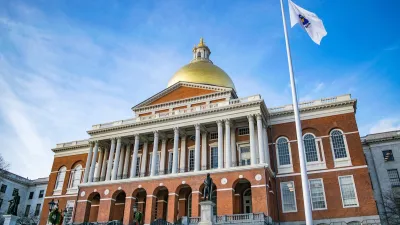Michigan—the state that spends less per capita on its roads than every other state—just got bad news about the state of its roads. Will it be enough to convince voters to pass a sales tax initiative to generate $1.2 billion in funding for roads?
"According to 2014 data from the Michigan Transportation Asset Management Council, only 17% of the state's roads are considered to be in good shape, 45% are in fair condition and 38% were considered to be in poor shape," reports Eric D. Lawrence.
The news precedes a May 5 ballot initiative before the state's voters "to decide on a complex measure that will raise the state sales tax to provide money for road repairs," adds Lawrence. Proposal 1, as its called, would raise $1.2 billion, but Lawrence indicates that the initiative's fate is far from certain. Planetizen correspondent Irvin Dawid elucidated the complexities of Proposal 1 in a January 30 article.
Lawrence provides details about the current political situation of Proposal 1 as well as providing a lot more detail about Michigan's current efforts to maintain and repair its transportation infrastructure. According to Lawrence, for instance, "Michigan spends less per capita on its roads than every other state, according to U.S. Census data, which said the state spent $126 per capita in 2012." That's a 6 percent drop since 2011 and it compares poorly with neighboring states. Ohio spends $258, Illinois $325, Indiana $339, Minnesota $241, and Wisconsin at $295.
FULL STORY: State of Michigan roads go from poor to terrible

Maui's Vacation Rental Debate Turns Ugly
Verbal attacks, misinformation campaigns and fistfights plague a high-stakes debate to convert thousands of vacation rentals into long-term housing.

Planetizen Federal Action Tracker
A weekly monitor of how Trump’s orders and actions are impacting planners and planning in America.

In Urban Planning, AI Prompting Could be the New Design Thinking
Creativity has long been key to great urban design. What if we see AI as our new creative partner?

King County Supportive Housing Program Offers Hope for Unhoused Residents
The county is taking a ‘Housing First’ approach that prioritizes getting people into housing, then offering wraparound supportive services.

Researchers Use AI to Get Clearer Picture of US Housing
Analysts are using artificial intelligence to supercharge their research by allowing them to comb through data faster. Though these AI tools can be error prone, they save time and housing researchers are optimistic about the future.

Making Shared Micromobility More Inclusive
Cities and shared mobility system operators can do more to include people with disabilities in planning and operations, per a new report.
Urban Design for Planners 1: Software Tools
This six-course series explores essential urban design concepts using open source software and equips planners with the tools they need to participate fully in the urban design process.
Planning for Universal Design
Learn the tools for implementing Universal Design in planning regulations.
planning NEXT
Appalachian Highlands Housing Partners
Mpact (founded as Rail~Volution)
City of Camden Redevelopment Agency
City of Astoria
City of Portland
City of Laramie



























